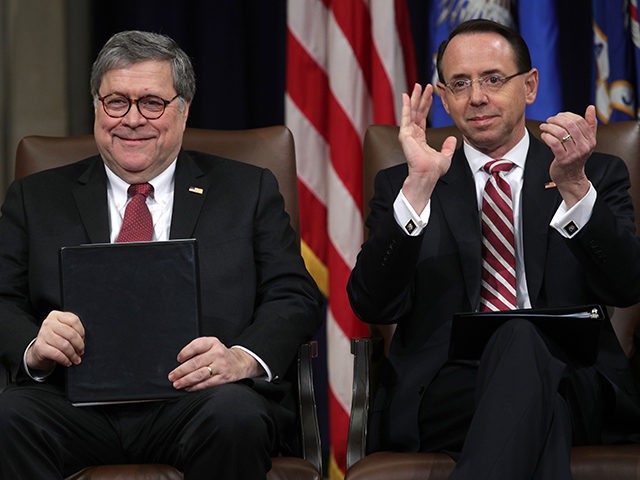Top Justice Department officials knew for weeks that special counsel Robert Mueller would not reach a conclusion on whether President Donald Trump obstructed the Russia investigation, torpedoing accusations of a rushed decision by Attorney General William Barr regarding the matter, according to a report.
CNN’s Laura Jarrett on Monday morning reported the special counsel notified both Barr and Deputy Attorney General Rod Rosenstein three weeks ago that a determination on the issue of obstruction would not be made — not, as critics claim, over a 48-hour time frame starting Friday when he received the report.
NEWS – on the obstruction piece of Mueller’s investigation – have learned that SCO told Barr/Rosenstein 3 wks ago he wouldn’t reach conclusion on obstruction, that was *not* expected; dispels notion Barr came up with his analysis in 48 hrs, he’s known for weeks what was coming
— Laura Jarrett (@LauraAJarrett) March 25, 2019
According to a four-page summary of Mueller’s findings, investigators found no evidence President Trump’s campaign “conspired or coordinated” with Russia to influence the 2016 presidential election but reached no conclusion on whether the president obstructed justice.
Following the summary’s release, top House Democrats criticized the speed in which Barr rendered his decision on the issue of obstruction.
“It is unacceptable that, after Special Counsel Mueller spent 22 months meticulously uncovering this evidence, Attorney General Barr made a decision not to charge the President in under 48 hours,” House committee chairs Jerry Nadler (D-NY), Elijah Cummings (D-MD), and Rep. Adam Schiff (D-CA) said in a joint statement Sunday evening.
Barr said he and Rosenstein had determined that Mueller’s evidence was insufficient to prove in court that the president had committed obstruction of justice to hamper the probe.
Further, the attorney general stated said the decision was based on the evidence uncovered by Mueller and not affected by Justice Department legal opinions that say a sitting president cannot be indicted.
Mueller’s team examined a series of actions by the president in the last two years to determine if he intended obstruction. Those include his firing of Comey one week before Mueller’s appointment, his public and private haranguing of then-Attorney General Jeff Sessions for recusing himself from the Russia investigation because of his work on the campaign, his alleged request of Comey to end an investigation into Michael Flynn, the White House’s first national security adviser, and his alleged drafting of an incomplete explanation about his oldest son’s meeting with a Russian lawyer during the campaign.
White House spokeswoman Sarah Sanders on Monday morning said President Trump will let Barr decide whether the special counsel’s Russia report should be publicly released, though she adds that “he’s more than happy for any of this stuff to come out.”
The Associated Press contributed to this report.

COMMENTS
Please let us know if you're having issues with commenting.